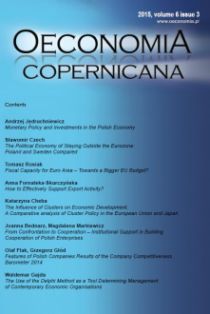Fiscal Capacity for Euro Area – Towards a Bigger EU Budget?
Fiscal Capacity for Euro Area – Towards a Bigger EU Budget?
Author(s): Tomasz RosiakSubject(s): Politics / Political Sciences, Politics, Economy, National Economy, Supranational / Global Economy, EU-Approach / EU-Accession / EU-Development
Published by: Instytut Badań Gospodarczych
Keywords: Fiscal capacity; Fiscal federalism; European Union; Euro area; EU Budget
Summary/Abstract: The European Union has recently implemented one of the biggest reform packages in its history. Developed solutions are designed to (1) strengthen EU’s resilience to shocks and (2) improve its shock absorption capabilities. It seems that so far the stress was mainly placed on the first objective. Among the reforms which satisfied the second objective the European Stability Mechanism (ESM) plays the key role. However, this is not the only solution. The European Union is also developing a fiscal capacity for the European Monetary Union (EMU). On the base of a subject literature study, I have developed a model with boundary conditions of fiscal federalism (FF), which then was compared to macroeconomic data for the EU. The results of my findings show that the European Union, and especially the euro area, share a lot of characteristics typical for fiscal federalism. The biggest difference between EMU’s structure and FF model is in-sufficient size of central budget. As a result, the euro area is not equipped with stabilization tools which could act on the very early stage of a crisis. From this point of view, implementation of fiscal capacity in the form of central budget could fill this gap. However, it could bring further fragmentation of economic integration process in the EU, which probably would not positively contribute towards the stability in the political sphere.
Journal: Oeconomia Copernicana
- Issue Year: 6/2015
- Issue No: 3
- Page Range: 45-60
- Page Count: 16
- Language: English

